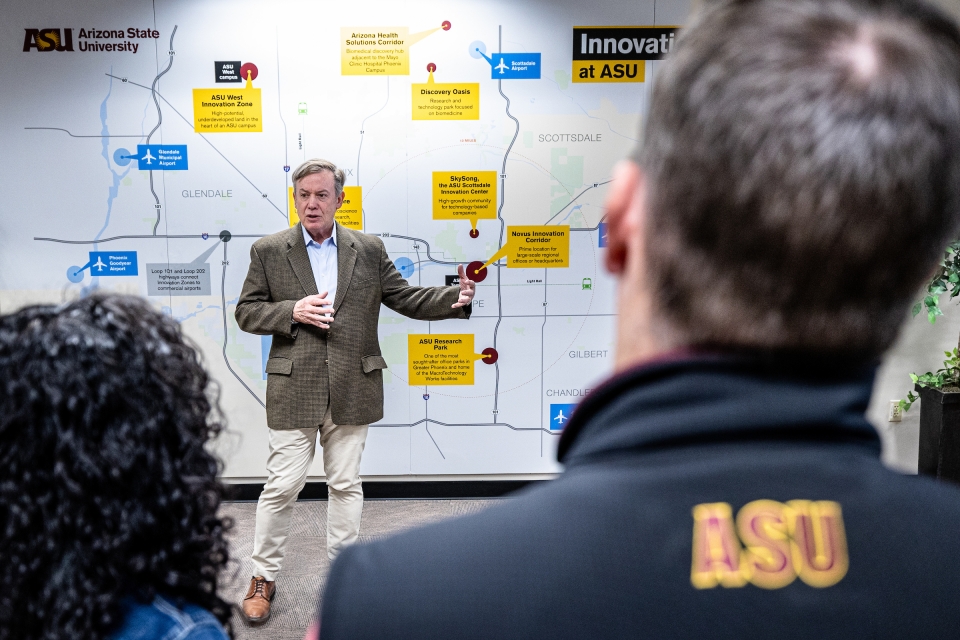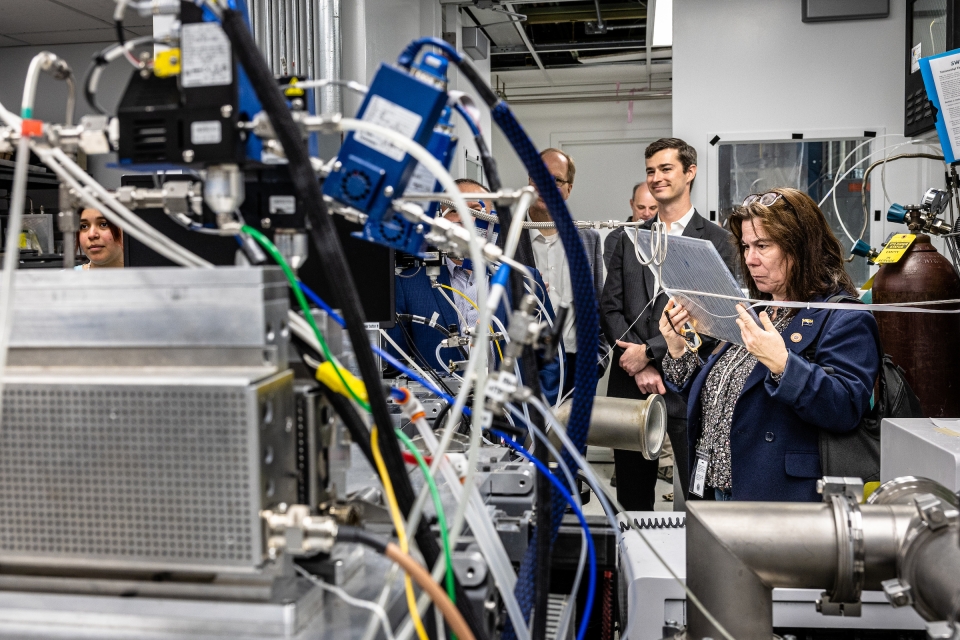Arizona legislators get up-close look at ASU semiconductor facility
Several Arizona state legislators heard from Arizona State University’s industry partners on Friday that the state needs to continue to step up its investment in the semiconductor industry.
The legislators toured the ASU MacroTechnology Works in Tempe, a unique lab and fabrication space that state support assists in serving as a resource to university researchers and community partners — from tiny ventures to big corporations.
The facility has allowed ASU to help bridge the critical gap between technology innovations created in a lab and solutions that are applied in real life, impacting everything from consumer products to tools of warfare and national defense.
The legislators heard how the facility has helped put ASU in the running for investment from the CHIPS and Science Act, passed with bipartisan support last year, which will distribute $52 billion to accelerate U.S. semiconductor manufacturing, an important step for economic competitiveness and national security.
Arizona also is a major player thanks to a $40 billion investment by the Taiwan Semiconductor Manufacturing Company (TSMC), which is building two gigantic chip-fabricating centers in north Phoenix.
ASU President Michael Crow told the group that the university bought the MacroTechnology Works building from Motorola in the early 2000s because it came with ability to have massive clean rooms that would allow semiconductor research and discovery capabilities.
The U.S. used to be the center of semiconductor manufacturing, but in the 1980s, most of it moved offshore to cheaper locations, mostly in Asia.
“By now, none of the manufacturing of the most advanced semiconductors is in the United States anymore, even though we were the founders of the technology, and only a small percentage of the manufacturing of any semiconductors is in the United States,” Crow said.

ASU President Michael Crow talks about the university's innovation zones with members of the Arizona state legislature during their tour of ASU’s MacroTechnology Works on Friday, March 10. Photo by Charlie Leight/ASU News
The Trump and Biden administrations decided that the U.S. needed to regain its superiority in semiconductor research, manufacturing and supply chain logistics as a national security issue, and that’s what the CHIPS and Science Act is intended to do.
The federal government wants to make sure that all of the semiconductors used in defense systems are produced in North America, according to Kevin McGinnis, managing director for strategic technology initiatives at ASU.
“Right now, we’re dependent on other countries to do that,” he said. “And not just today, but 10 to 15 years from now, each of these systems will get more and more complex.
“Here, we’re trying out new concepts and new prototypes, and the goal is to put them in defense systems.”
Part of Arizona’s preparation to build up America’s semiconductor capacity is the New Economy Initiative, a massive collaboration among the state’s three public universities, private companies and state government to bring Arizona to the frontier of high-tech industry.
Funded by the state, the New Economy Initiative’s goals are to create 40,000 new high-wage jobs by 2041, increase economic output to $6.9 billion by 2032 and double the return on the state’s investment by the same year.
The technology and expertise required for semiconductors is exceedingly difficult as more and more chips are required for complex systems, such as medical devices and cars.
Nirmalya Maity, corporate vice president at Applied Materials, the world’s largest supplier of semiconductor-manufacturing equipment, said his company plans to triple the size of its research footprint at MacroTechnology Works.
“We build the systems that manipulate materials at literally an atomic scale, atom by atom,” he said.
During their tour of the facility, the legislators donned paper booties and visited several labs and a clean room in the facility. They also heard from industry partners that the critical need for investment is in the workforce.

Arizona Rep. Stacey Travers looks at a sample of treated and untreated solar panels in the Swift Coat lab in ASU’s MacroTechnology Works during a tour of the facility on Friday, March 10. Photo by Charlie Leight/ASU News
TSMC hired 600 employees here and sent them to Taiwan for a year to train, and the company also will bring about 1,000 engineers from Taiwan for a year to set up the fabrication plant.
The company is creating 4,500 jobs in Arizona and ASU is the number one school for hiring, with about 20% of the workforce, she said.
“Of these jobs, around 3,000 will be four-year engineering degrees. So we want the majority to be from ASU, but we need to make those investments,” she said.
Maity said that his company’s most important need is talent.
“We need 250,000 people in the U.S. trained in semiconductor technology to build this industry,” he said.
His company’s expansion will allow more ASU students access to technology that will prepare them to work in the industry, he said.
He said speed is also important.
“Often where we get stuck is on regulatory approvals where we’re waiting around and not going as fast as in Taiwan or Korea, and that’s where the help from the government is very useful,” he said.
“We’re getting ready for a $1 trillion semiconductor industry – double the size of today.
“To support a $1 trillion industry, a lot needs to be invested. Every country realizes that the semiconductor industry is key to national security and every country is investing.”
Daniel Witt, director of public policy for Lucid Motors, an electric vehicle manufacturer that has a plant with 3,000 employees in Casa Grande, said the state needs to think beyond semiconductors.
“Something the state of Arizona hasn’t had is much of anything in the automotive sector,” he said, adding that Lucid can be the linchpin of a new kind of economy.
“This is an economy that’s different from the semiconductor industry because it’s more workforce intensive,” he said.
He said his company needs a facility like the MacroTechnology Works to bridge the lab-to-fab gap in electric vehicle manufacturing, and that could cement Arizona as a focus of the industry.
Justin Wilmeth, a Republican member of the state House of Representatives who is chair of the House Commerce Committee, asked the industry representatives how he can emphasize the need for investment to his constituents and fellow caucus members.
“How can I tell people how important this is for our domestic security and foreign policy because we have to bring this stuff home, and they don’t understand the threat of China and Russia working together?
“How do I pitch it to people that Arizona is on the forefront of this?”
McGinnis, who has a defense background, gave an example:
“In Russia now, they have to take chips out of their washing machines to try to fix their tanks.
“What we have to worry about is that in 10 years, if we don’t control this technology, the Chinese will make us take chips out of our washing machines, and we can’t be in that position,” he said.
Sally Morton, executive vice president of ASU’s Knowledge Enterprise, said, “Do we really want the aircraft of our Air Force flying around with chips that are not only built in China but tested in China?
“We have all the pieces here now. We have TSMC, we have suppliers, we have the academics and we have the support all coming together in one place.”
Top photo: Kevin Reinhart, director of the Research Project Management Office in ASU's Knowledge Enterprise, shows members of the Arizona state legislature a sample produced in the photolithography lab at ASU’s MacroTechnology Works on Friday, March 10. Photo by Charlie Leight/ASU News